
25500395
Rev. C2 0323
Printed in U.S.A.
© Copyright 2017-2023 Federal Signal Corporation
Informer-IP Series C
Models: I-IP-IO, I-IPW, I-IP15, I-IP15X, I-IP100AC,
I-IP100DC, I-IP100ACX, I-IP100DCX, I-IP2, I-IPSIU
Setup, Program, and User Manual

Limited Warranty
This product is subject to and covered by a limited warranty,
a copy of which can be found at www.fedsig.com/SSG-Warranty.
A copy of this limited warranty can also be obtained by written
request to Federal Signal Corporation, 2645 Federal Signal Drive,
University Park, IL 60484, email to [email protected] or call
+1 708-534-3400.
This limited warranty is in lieu of all other warranties, express or
implied, contractual or statutory, including, but not limited to the
warranty of merchantability, warranty of tness for a particular
purpose and any warranty against failure of its essential purpose.
2645 Federal Signal Drive
University Park, Illinois 60484-3617
www.fedsig.com
Customer Support 800-548-7229 • +1 708 534-3400
Technical Support 800-524-3021 • +1 708 534-3400
All product names or trademarks are properties of their respective owners.

3
Setup, Program, and User Manual
Federal Signal www.fedsig.com
Contents
Safety Messages......................................................................................................................................................7
General Description ................................................................................................................................................7
Introduction .........................................................................................................................................................7
Informer Series C Overview....................................................................................................................................8
Automatic Volume Level Control ......................................................................................................................... 8
Digital Inputs .......................................................................................................................................................8
Informer SIP Telephone Interface .......................................................................................................................9
Informer Control using IP Phone Keypad ...........................................................................................................9
WAV File Control Commands ...........................................................................................................................10
Valid WAV File Control Commands ...........................................................................................................10
Invalid WAV File Control Commands ........................................................................................................10
Function Control Commands ............................................................................................................................ 11
Valid Function Control Commands ........................................................................................................... 11
Invalid Function Control Commands ......................................................................................................... 11
Modbus TCP .....................................................................................................................................................12
Supported Protocols .........................................................................................................................................12
Notes .........................................................................................................................................................13
Modbus with Commander .................................................................................................................................14
CommanderOne Enabled .................................................................................................................................15
Conguring Informers Using the Web Interface .................................................................................................16
1. Conguring the Network Interface ................................................................................................................16
Conguring the Network Interface through the Web Browser ...................................................................16
Changing the Network Settings ................................................................................................................19
2. Conguring the RTU Settings .......................................................................................................................21
3. Conguring the Multicast Zones ...................................................................................................................27
4. Conguring Security ......................................................................................................................................30
5. Conguring the User Setup ...........................................................................................................................31
6. Uploading Certicates ................................................................................................................................... 33
7. Uploading Firmware ...................................................................................................................................... 34
8. Rebooting Device and Loading Conguration Settings ................................................................................35
9. Restoring Conguration to Factory Defaults .................................................................................................36
Restoring the Informer-IP and I-IPW to Factory Default ...........................................................................37

4
Informer-IP Series C
Federal Signal www.fedsig.com
Restoring the Informer100, I-IP15, I-IP2, and I-IPSIU to Factory Default ................................................. 37
10. Logging Out of the Web Interface ...............................................................................................................39
Conguring Informers Using Commander Software (Optional) .......................................................................40
1. Verify SmartMsg CenterPoint Software ........................................................................................................40
2. Using SmartMsg CenterPoint Software ........................................................................................................41
3. Conguring the Security Code and Encryption Key (Optional) .....................................................................42
4. Conguring RTUs in Commander .................................................................................................................43
Initial Informer Setup .................................................................................................................................43
5. Uploading WAV Files to the Informers ..........................................................................................................46
6. Programming Functions ................................................................................................................................ 51
Alerts ......................................................................................................................................................... 51
Relay Outputs ...........................................................................................................................................51
Creating Functions ....................................................................................................................................52
Copying Functions from another RTU ......................................................................................................57
7. Conguring Zones .........................................................................................................................................58
Dynamic Zoning ........................................................................................................................................58
8. Creating Activation Templates .......................................................................................................................60
9. Conguring Input Options .............................................................................................................................64
Local Activation Inputs (Informer15 and Informer100) .............................................................................. 66
10. Conguring Commander Hotkeys ............................................................................................................... 68
11. Programming Listening Options .................................................................................................................. 70
12. Conguring Informer15 and Informer100 PA (VoIP) Settings .....................................................................72
Using Power/Ambient Attenuation Threshold ...........................................................................................72
13. Conguring the I-IPSIU Radio Settings .......................................................................................................73
Using Informer Intercom .......................................................................................................................................75
Using the Public Address System .......................................................................................................................77
Broadcasting Messages ....................................................................................................................................78
Broadcasting WAV Files ....................................................................................................................................80
Broadcasting Text to Speech (TTS) ..................................................................................................................81
Using the Informer-IP ............................................................................................................................................82
Front Panel Display ...........................................................................................................................................82
Adjusting the Volume ................................................................................................................................82
Dual Relay ........................................................................................................................................................83

5
Setup, Program, and User Manual
Federal Signal www.fedsig.com
Relay Outputs ...........................................................................................................................................83
600-Ohms Audio Output ...........................................................................................................................84
Generating Alerts ..............................................................................................................................................84
Conguring Inputs ............................................................................................................................................. 84
Testing and Training ..............................................................................................................................................85
Getting Service ......................................................................................................................................................85
Appendix A Updating RTU Firmware ................................................................................................................... 86
Appendix B Forms .................................................................................................................................................88
Appendix C Standard DV Messages ..................................................................................................................101

6
Informer-IP Series C
Federal Signal www.fedsig.com
Tables
Table 1 Input and Output Conguration ............................................................................................................... 9
Table 2 Examples of Illegal WAV Files ................................................................................................................. 10
Table 3 Examples of Illegal Function Control Commands ................................................................................ 11
Table 4 Coil Registers (1-9999) Read -Write .........................................................................................................12
Table 5 Analog Output Holding Registers (40001-49999+) Read-Write ............................................................13
Table 6 Commander Modbus Map .......................................................................................................................14
Table 7 Register Number (3x) ...............................................................................................................................14
Table 8 Register Number (4x) ...............................................................................................................................14
Table 9 Function Denitions .................................................................................................................................55
Table 10 Informer-IP Buttons ................................................................................................................................83
Table 11 Informer Network Conguration ...........................................................................................................88
Table 12 Network Device .......................................................................................................................................89
Table 13 WAV File Messages (DV Messages) .....................................................................................................91
Table 14 Programed Functions ............................................................................................................................92
Table 15 Programed Zones ................................................................................................................................... 93
Table 16 Programed Activation Templates ..........................................................................................................94
Table 17 Input Programming Informer .................................................................................................................95
Table 18 Hotkeys ...................................................................................................................................................96
Table 19 Informer Input Conguration ................................................................................................................99
Table 20 Standard DV Messages ........................................................................................................................101

7
Safety Messages
Setup, Program, and User Manual
Federal Signal www.fedsig.com
Safety Messages
It is important to follow all instructions shipped with this product. This device
is to be installed by trained personnel who are thoroughly familiar with the
country electric codes and will follow these guidelines as well as local codes and
ordinances, including any state or local noise-control ordinances.
After installation, service, or maintenance, test the system to confirm that it is operating
properly. Test the system regularly to confirm that it will be operational in an emergency.
Each Informer device has its own Installation Manual. See fedsig.com for online manuals.
General Description
Introduction
This manual describes how to set up, configure, program, and use Informer-IP devices.
Each Informer device has its own Installation Manual. See fedsig.com for online manuals.
This manual covers the following Informer devices:
• Informer-IP Desk Mount (I-IP-IO)
• Informer-IP Wall Mount (I-IPW)
• Informer15 Speaker (I-IP15 and I-IP15X)
• Informer100 Speaker (I-IP100AC, I-IP100DC, I-IP100ACX, and I-IP100DCX )
• Informer-PA for Public Address Interface (I-IP2)
• Informer Sensor Interface Unit (I-IPSIU)
Federal Signal Informers can be set up in a wide variety of networks and configurations.
This manual provides a standard setup and programming process for Informer products.
See the Commander® Software Reference Manual or contact Federal Signal for special
applications using Informer devices. Appendix B contains configuration tables for
documenting how your Informers and Commander® are programmed.
This manual does not pertain to Informer Series A or B products. See “Getting Service”
on page 85 for Federal Signal’s contact information for Series A or B I-IP15 upgrade
instructions. Other Series A or B Informer models are not hardware compatible with
SeriesC software.

8
Informer Series C Overview
Informer-IP Series C
Federal Signal www.fedsig.com
Informer Series C Overview
The Federal Signal Informer series IP products incorporate industry-standard Web, SIP
phone, and Modbus® PLC interfaces to simplify integration with existing systems. The
products can be purchased as part of a pre-integrated Commander® IP solution with a
touch screen HMI that can simplify configuring, controlling, and monitoring thousands
of unique alert and notification scenarios. Commander® includes options for digital
and analog RF, Cellular, Satellite, and CommanderOne® cloud services for messaging
and automated NOAA Weather alerting. CommanderOne® iOS and Android® mobile
applications keep you connected with controlling, monitoring, and messaging wherever
you go.
Store over 4000 WAV files containing tones, music, or voice messages on a removable
SD card in the Informers. The WAV files can be configured to play when a local input
is activated or remotely using the SIP, Modbus®, and Commander® interfaces. The
Informer indoor and outdoor speakers include four digital inputs. These inputs can be
configured to directly activate the speaker to play a string of 1-19 WAV files and control
integrated relay output(s) or initiate predefined macros to activate multiple speakers
when the Commander® application is purchased. The inputs can be remotely monitored
and configured to activate other speakers when integrated with the Commander® HMI.
The Informers are remotely configurable and can obtain software updates through the
speaker’s web page and the optional Commander® software application.
Automatic Volume Level Control
The Informer speakers can be configured to automatically adjust the speaker’s output
level when the local ambient noise level changes. Configure the maximum level and
ambient attenuation settings on the Informer’s web page.
NOTE: Automatic volume control is not available with the I-IP2 and I-IPSIU products.
Digital Inputs
The Informers have digital inputs that can be activated using a dry contact closure.
Configure the inputs from the Informer’s web page. See “2. Configuring the RTU Settings”
on page 21. Each input can be configured to play 1-19 WAV files when the input is
activated. The WAV files to be played are entered by index number in a comma-separated
list, for example, 1,2,6. Relay outputs can be selected to close when the input is active and
remains closed until the associated WAV file(s) have finished playing.
The inputs can be configured for normally open or normally closed contacts and assigned
a priority level of 1 to n (n = number of inputs available in the product). The inputs can be
configured for momentary or continuous operation, or they can be disabled. Momentary
inputs will play the associated WAV file one time when the state changes to active.
Continuous configured inputs will continue to play the associated WAV files and open
or close associated relay output(s) as long as the input is active. If multiple continuous
inputs are active, the WAV files and relay outputs associated with each input will activate
in sequence. Lower priority inputs are ignored while higher priority inputs are active.
If an equal or greater priority momentary input is activated while a continuous input is
active, the momentary input will interrupt the WAV file and relay controls associated with
the continuous input. The continuous input(s) will resume control when the WAV file(s)
associated with the momentary input finish playing. Equal or higher priority momentary
inputs will override other active momentary controls.

9
Informer Series C Overview
Setup, Program, and User Manual
Federal Signal www.fedsig.com
The digital inputs may also be configured using the Commander® application. The
Commander® application will override web page configurations.
Web page configurations must be applied, and the Informer must be rebooted before the
changes take eect.
Table 1 Input and Output Conguration
Product Family Number of Inputs Number of Outputs
I-IP-IO N/A N/A
I-IP15 4 2
I-IP100 4 2
I-IP2 N/A N/A
I-IPSIU 16 4
Informer SIP Telephone Interface
The Informers can register with a standard SIP phone server and automatically answer
calls for live voice paging. Once a call is established with the Informer, the Informer
will listen for commands initiated from the phone’s keypad. Keypad commands can
be configured to activate locally stored WAV files, control relay outputs, and execute
preprogrammed functions, including volume control, relay output sequences, and tone
and voice message sequences.
To configure SIP setting, use the Informer’s integrated web server’s web page. SIP SDP,
secure SDP TLS, RTP, and RTP Telephone Events (RFC2833/4733) are supported. The
Informers include a configurable Jitter Buer, Quality of Service (QoS), and support
redundant SIP servers to ensure high reliability for emergency communications.
Federal Signal oers complete SIP server and Gateway options that include paging to
speakers’ groups by dialing a single phone extension. Single-button paging stations and
touchscreen phones with configurable call buttons are also available.
Informer Control using IP Phone Keypad
When a SIP phone call has been established with a Federal Signal Informer IP product, the
Informer is able to decode DTMF characters sent as RTP Telephone Events to activate the
Informer’s locally stored WAV files and preprogrammed functions. The DTMF Telephone
Events are initiated by pressing the 0-9, * (asterisk), and # (pound) keys on the phone’s
keypad on a SIP phone system that supports Telephone Events per RFC2833/4733. DTMF
audio from the control signals will not be heard from the Informer, and handset audio
will be interrupted while the Telephone Event is active to prevent unwanted noise while
control commands are being initiated. The Informer uses the DTMF * and # as start and
stop Framing Characters to frame numeric control commands. The * (asterisk) character is
used to frame WAV file playback commands, and the # (pound) character is used to frame
the Informer function control commands. These commands are explained in the Control
Command sections.
When the first DTMF (Start) framing character is received, the Informer starts reading
the control number digits for 5 seconds or until the second (Stop) framing character is
received or until an illegal character is received. Each digit received restarts the 5-second
timer. When the second framing character is received, the valid digits read will determine
the control command number. One to four digits, including the valid digit numbers 0-9,
may be entered. If any character other than the framing characters or valid digit number

10
Informer Series C Overview
Informer-IP Series C
Federal Signal www.fedsig.com
is received or the 5-second character entry period expires, the framing character and any
valid digits read are treated as noise and discarded. Leading 0 (zeros) digits are allowed
but not required.
When a valid command is received, the Informer acknowledges the receipt by sending
three short beeps, hanging up, and playing the WAV file or activating the function.
Acknowledgment beeps are not heard if more than one speaker is included in a group
call (phone page).
NOTE: Not all SIP servers will be able to relay acknowledgment beeps if more than one
speaker is included in a group call (phone page).
WAV File Control Commands
The Informer can store over 4000 WAV files containing tones, music, or voice messages
on a removable SD card. The WAV files are stored in numerical order and can be
commanded to play by the WAV file index number.
NOTE: There are over 160 standard messages included on the SD card. See “Appendix C
Standard DV Messages” on page 101 for a complete list.
Valid WAV File Control Commands
The format of the SIP phone command is *number*.
Examples of valid WAV file Control Commands: *1*, *0010*, *4093*
Invalid WAV File Control Commands
Examples of illegal WAV file Control Commands.
Table 2 Examples of Illegal WAV Files
Invalid WAV
Files Control
Commands
Why
*1 Missing end of frame character. The entry is discarded 5 seconds
after 1 is received.
111* Missing start of frame character before 111. The entry is discarded
5 seconds after * is received.
*1# # is not a legal framing character for WAV le control and cannot
be used in a command with a * framing character. The entry is
discarded 5 seconds after # is received.
#1*1* # is not a valid WAV le framing character. #1 is discarded, but *1* is
accepted to activate WAV le number one.
#1# #1# is a Function Control command that activates Function #1 and is
not a WAV le command.
*1A* A is not a legal digit. The entry is discarded 5 seconds after * is
received.
*5000* Valid WAV le index numbers are limited to 1-4093. The entry is
discarded 5 seconds after * is received.
When a valid command is received to play a WAV file, the Informer acknowledges the
receipt by sending three short beeps, hanging up, and playing the WAV file.

11
Informer Series C Overview
Setup, Program, and User Manual
Federal Signal www.fedsig.com
Function Control Commands
Function Control commands are used to activate functions that have been preconfigured
into the Informer. Functions can be configured to control audio volume, activate relay
outputs, play tones and WAV files. Functions configured with Commander® can also
include delays and repeat loops.
The input functions can be configured on the Informer’s web page and activated by
initiating local digital inputs on the Informer or by using the Modbus® and SIP interfaces.
Up to 50 functions can be configured using the Federal Signal Commander® software
application. If Commander® is used to program the Informer, Commander® will override
the web page configuration and change the Digital Inputs Mode options to Commander®
on the RTU Settings page.
NOTE: I-IPSIU inputs cannot be configured to run local functions; instead, they can
execute Commander® Activation Templates.
Valid Function Control Commands
The format of the SIP phone command is #number#.
Examples of valid Function Control Commands: #1#, #0010#, #50#
Invalid Function Control Commands
Examples of illegal Function Control Commands.
Table 3 Examples of Illegal Function Control Commands
Invalid Function
Control Commands
Why
#1 Missing end of frame character. The entry is discarded 5 seconds
after 1 is received.
111# Missing start of frame character before 111. The entry is discarded
5 seconds after # is received.
*1# * is not a legal framing character for function control and cannot
be used in a command with a # framing character. The entry is
discarded 5 seconds after # is received.
#1*1* #1 does not include a valid end of frame character for function
control. *1* is a valid WAV le command that plays WAV le
number one.
*1* *1* is a WAV le control command that activates WAV le #1, but it
is not a Function Control command.
#1A# A is not a legal digit. The entry will be discarded.
#500# Valid function numbers are limited to 1-50. The entry is discarded
5 seconds after the # stop character is received.
When a valid function command is received, the Informer acknowledges the receipt by
sending three short beeps, hanging up, and activating the function.

12
Informer Series C Overview
Informer-IP Series C
Federal Signal www.fedsig.com
Modbus TCP
Modbus® TCP can directly control and monitor speakers from an existing PLC over an
Ethernet network. This interface provides direct control of WAV files and relay output(s) in
the speaker. The interface also provides the ability to monitor the speaker’s digital inputs
and activation status.
Digital Coil Registers are used to monitor Activation Status, Digital Input Status, and
Time Synchronization Status. Analog Registers are used to play WAV files and activate
preprogrammed functions. Preconfigured programs and WAV files can be activated, relay
outputs can be controlled, and speaker status can be monitored.
The number of inputs and outputs for each Informer model are listed in “Table 1 Input and
Output Configuration” on page 9.
Supported Protocols
Use the interface that supports the Modbus® TCP protocol. Configure the Modbus®
interface on the unit’s web page. There are two configuration options:
• Enable or Disable the Modbus® interface
• The TCP port number
NOTE: Most systems use the default Modbus® port number of 502.
Table 4 Coil Registers (1-9999) Read -Write
Coil data
address
Coil
number (0x)
Function Value
0 1 Activation Status 0 = activation not detected, 1 = activation detected
(Status resets with each new function)
1 2 Input #1 0 = closed, 1 = open (State follows the physical input
port)
2 3 Input #2 0 = closed, 1 = open (State follows the physical input
port)
3 4 Input #3 0 = closed, 1 = open (State follows the physical input
port)
4 5 Input #4 0 = closed, 1 = open (State follows the physical input
port)
5 6 Time synchronization
status
0 = pass, 1 = fail
The software versions listed below are the minimum versions that support the Series C
Modbus® interface. A firmware upgrade will be required to use the Modbus® interface if
the RTU firmware is below these minimum requirements.
• DIGI v2.1.0.44
• IP15 v2.3.0.11
• IP100 v5.2.0.30

13
Informer Series C Overview
Setup, Program, and User Manual
Federal Signal www.fedsig.com
Table 5 Analog Output Holding Registers (40001-49999+) Read-Write
Analog
Output data
address
Register
Number (4x)
Function Value
0 40001 Activate function code Function code number to activate
1 40002 Activate digital voice message (unit
must be armed)
Digital voice message number to
activate
2 40003 Activate tone function (unit must be
armed)
1 = Wail, 2 = Pulsed Wail,
3 = Alternate Wail, 4 = Steady,
5 = Pulsed Steady,
6 = Alternate Steady,
7 = Auxiliary
3 40004 Activate utility function
Arm clears attenuation values (full
volume). Attenuation values must be set
after arming unit.
0 = Arm, 1 = Disarm,
2 = Master Reset, 3 = Cancel,
4 = Quiet Test
4 40005 Power Attenuation (must be set
following arm)
0-20 dB
5 40006 Ambient Attenuation (must be set
following arm)
0 = Disabled, 50-80 dB
6 40007 Relay 1 Mode (time values, if
applicable, must be set rst)
0 = Off, 1 = On, 2 = Timed,
3 = Latched
7 40008 Relay 1 On Time 0-255 seconds
8 40009 Relay 1 Off Time 0-255 seconds
9 40010 Relay 1 Total Time 0-65535 seconds
10 40011 Relay 2 Mode (time values if applicable
must be set rst)
0 = Off, 1 = On, 2 = Timed,
3 = Latched
11 40012 Relay 2 On Time 0-255 seconds
12 40013 Relay 2 Off Time 0-255 seconds
13 40014 Relay 2 Total Time 0-65535 seconds
9999 50000 None 15920 (do not use)
10000 50001 None 12557 (do not use)
Notes
Digital voice messages are WAV files.
Arming the unit clears attenuation values (full volume). If attenuation is desired when
activating digital voice messages (address 1) or tones (address 2), the attenuation values
(address 4,5) must be set after the units are armed.
Activating digital voice (address 1) and tone (address 2) clears the activation status. The
unit will report local activation and report the last function RTU as Digital Voice, PA, or
Siren Tone to Commander® (v15.8.0.33+). Commander® will report the Last Activation
faults.

14
Informer Series C Overview
Informer-IP Series C
Federal Signal www.fedsig.com
Modbus with Commander
Modbus® TCP can also be used to connect PLCs to the Commander® HMI (Human
Machine Interface). Commander® can be used to configure the speakers over the network
and provide control and status monitoring. Commander® oers a configurable HMI that
simplifies the activation of unique notification messages created with simplified touch
screen menu selections for events, locations, actions, etc.
Both digital (coils) and analog registers are supported. Preconfigured programs and
WAV files can be activated, relay outputs can be controlled, and speaker status can be
monitored.
Table 6 Commander Modbus Map
Output Coil
Address (0x)
Coil
number (0x)
Function Value
0 1 Cancel 1 = Cancel
1-30 2-31 Hotkeys 1-30 1 = Active (one shot)
31-999 32-1000 Template number 1-969
(Template number = ADDRESS - 30)
1 = Active (one shot)
Table 7 Register Number (3x)
Analog
Input
Register
Address
Register
Number
(3x)
Function Value
0 30001 Last activation number RTUs pending Number of sites pending (not reported)
1 30002 Last activation number RTUs pass Number of sites reported with not faults
2 30003 Last activation number RTUs fail Number of with reported with faults
3 30004 Last activation total number RTUs Total number of sites included in last
activation
Table 8 Register Number (4x)
Analog Input
Register (4x)
Register
Number (4x)
Function Value
0 40001 Activate Hotkey Hotkey number to activate. Zero = Cancel All
1 40002 Activate template Template number to activate
Additional Commander® Features:
• Remote system configuration, programming, and digital voice message uploading
• Create activation templates to simplify system activation
• Send messages to scrolling message displays
• Event logging and reporting
• Email users when specific events occur

15
Informer Series C Overview
Setup, Program, and User Manual
Federal Signal www.fedsig.com
• Automated activations
• CommanderOne® cloud interface
CommanderOne Enabled
CommanderOne® is a secure cloud service oered by Federal Signal that allows remote
communication with Commander® through a website or the CommanderOne® app for
iPhone and Android® mobile phones.
CommanderOne® Highlights:
• High-security, multi-factor authentication with multiple activation security levels
• High capacity messaging using email, SMS, and push notifications
• Remote triggering of events within Commander®
• System status monitoring of speakers on a GIS map
• Weather monitoring on a GIS map with automated system activation options
• Automated System Alarms

16
Conguring Informers Using the Web Interface
Informer-IP Series C
Federal Signal www.fedsig.com
Conguring Informers Using the Web Interface
Informer products can operate as autonomous devices controlled by contact closures
without connecting to a network server or becoming part of a supervised network with
remote configuration, control, and status monitoring. Use the Informer’s internal web
server to configure network settings, volume control, remote input configuration, access
security, Modbus®, and SIP interfaces. More advanced configuration and programming
require Federal Signal’s Commander® software application and SmartMsg Centerpoint
server. All configuration starts with the IP network interface.
1. Conguring the Network Interface
Before using an Informer on your network, a System Administrator must perform
configurations. The System Administrator must be familiar with IP network equipment,
this manual, and optionally the Commander® Software Reference Manual. Proper
configuration settings are required for the network to be able to reliably communicate
with the device and create a redundant, fail-safe network architecture for your system.
You can statically address the Informer or configure it for DHCP. For permanent
installations and good network management, it is recommended to reserve static IP
addresses for all Informer devices on the network. The factory default setting places the
Informer on a static IP address of 10.10.10.1 with a subnet mask of 255.255.0.0 on port
16887. If the configuration information is lost, restore the unit to this factory default setting
with a hardware reset.
Reserve static (typically private) IP addresses on your network for each Federal
Signal network server and for each Informer and any other Federal Signal network
equipment such as sirens, SIU, or PA interface devices. If the Informers are used with the
Commander® application, you must reserve a unique numeric site ID number for use by
the Commander® software to identify each Commander® Control Station, Informer, and
siren devices. Do not duplicate IP addresses or site ID numbers on the network at any
time, or network errors occur. Informer and Siren Site ID numbers start at number 001 and
are numbered sequentially. Commander® Control Station Site ID numbers start at number
900.
Conguring the Network Interface through the Web Browser
If the configuration details are lost or changed incorrectly, restore the Informer to factory
default settings. See “9. Restoring Configuration to Factory Defaults” on page 36.
Login
To configure the network interface through the web browser:
1. Before installing Informer devices on an IP network, connect your PC to the Informer
device using a LAN cable. Turn on the Informer device.
2. Change your Local Area Connection (Ethernet) adapter address to the following:
IP Address: 10.10.10.10
Subnet Mask: 255.255.0.0
Default Gateway: 10.10.10.10
This will allow you to access the Informer at its default IP address (10.10.10.1).

17
Conguring Informers Using the Web Interface
Setup, Program, and User Manual
Federal Signal www.fedsig.com
3. Enter the default 10.10.10.1 IP address or the preconfigured static address for the
Informer into your web browser to view the web page of the device.
The Login window appears.
4. Enter the Username:
admin (or preconfigured Username)
NOTE: If you change the Username or Password, record them in Appendix B, “Table
11 Informer Network Configuration” on page 88.
5. Enter the Password:
fedsig (or preconfigured Password)
NOTE: The password is case sensitive.
6. Click OK.

18
Conguring Informers Using the Web Interface
Informer-IP Series C
Federal Signal www.fedsig.com
The Home page appears.
The Home page displays a summary of the current configuration settings for the RTU.
The Navigation Menu (blue hyperlinks on the left) is used to access other System
Management web pages. Use the Help hyperlink to access the user manual from any
web page.
NOTE: It may take up to 1 minute to update all the fields on the Home page after
applying power or resetting the RTU. Click the Home menu to refresh and update the
page.
Fields Description
Model The RTU model of the device. This eld will be blank for a few
minutes following power up or master reset.
RTU Number The RTU’s assigned identity.
Description The RTU’s description.
SmartMsg
Server
The RTU’s assigned default SmartMsg server.
SmartMsg
Failover List
The RTU’s SmartMsg Failover List. This eld is blank until the unit
successfully connects to the server and retrieves the failover list.
SIP Status The RTU’s SIP connection status. When the RTU is registered with a
SIP server, the status will be Online, and the SIP server’s IP address
will be displayed. Ofine will be displayed when the RTU is not
registered with a SIP server.
MAC Address The MAC Address of the device.
IPv4
Addresses
The RTU’s assigned IPV4 address or its domain name.
DIGI Firmware
Version
The rmware version of the DIGI Connect ME 9210 module.
RTU Firmware
Version
The rmware version of the RTU.

19
Conguring Informers Using the Web Interface
Setup, Program, and User Manual
Federal Signal www.fedsig.com
Fields Description
Up Time The elapsed time since power up or reboot.
7. Record the MAC and IP address in Appendix B to ensure the device can be managed
in the future.
Changing the Network Settings
You can configure the RTU to obtain an IP address automatically using DHCP and AutoIP,
or you can assign a Static IP address. Coordinate the static IP addresses with the system
Network Manager to prevent address duplication.
You cannot leave the Default Gateway blank when a static IP address is assigned. A valid
IP address is required. Use the server’s IP address as the gateway if making a direct
Ethernet connection to the device.
After changes are made, click the Apply button and Reboot the RTU to begin using the
new configuration settings. Reboot the RTU by cycling power or from the Reboot web
page.
Use a MAC/IP address discovery tool to locate the IP address of the RTU if the network
configuration settings are lost, misconfigured, or if DHCP is used. You must use the
tool on the same side of a network router as the RTU. Contact Federal Signal Customer
Support; see “Getting Service” on page 85 with the discovery tool.
1. Select Network. The Network Settings page appears.

20
Conguring Informers Using the Web Interface
Informer-IP Series C
Federal Signal www.fedsig.com
Fields Description
Obtain an
IP address
automatically
When the device is rebooted, it obtains new network settings
automatically from the network DHCP server.
Use the
following IP
address
Supplies static settings. You must enter an IP Address, Subnet Mask,
and Gateway. A DNS server address is only required if domain names
are used instead of IP addresses.
IP Address or
Domain Name
The RTU’s assigned IPV4 address or its domain name in the IP
address eld.
Subnet Mask The RTU’s assigned subnet mask.
Default
Gateway
The RTU’s network gateway for routing IP trafc.
Primary DNS The Primary Domain Name Server for the network. (Must be entered
if the RTU is required to connect to a server by its domain name.)
Secondary
DNS
The Secondary Domain Name Server for the network.
Apply Saves your settings. You must reboot for changes to take effect.
2. Select the Use the following IP address option button.
3. Enter the static IP Address, Subnet Mask, and Default Gateway for the Informer
device.
4. Click Apply.
5. Reboot the device for the IP address change to take eect.
NOTE: If the Informer will be used autonomously without residing on an IP network, use
the default settings network to configure the Informer. If the Informer is connected to
a network, the factory default IP settings must be changed to work with the IP network
that the product will be connected to. Consult with your Network Manager to ensure the
settings adhere to your network policy.
Once the IP address is changed, configuration is only possible when the Informer and
the configuration computer are placed on the same network together. Reconfigure the
configuration computer’s IP settings before returning to the same network. You now need
to log in to the web page with the new IP address after the address is changed.
NOTE: You can use DHCP to simplify Informer deployment, but MAC address discovery
tools may not traverse routers, and maintenance may be more dicult.
Page is loading ...
Page is loading ...
Page is loading ...
Page is loading ...
Page is loading ...
Page is loading ...
Page is loading ...
Page is loading ...
Page is loading ...
Page is loading ...
Page is loading ...
Page is loading ...
Page is loading ...
Page is loading ...
Page is loading ...
Page is loading ...
Page is loading ...
Page is loading ...
Page is loading ...
Page is loading ...
Page is loading ...
Page is loading ...
Page is loading ...
Page is loading ...
Page is loading ...
Page is loading ...
Page is loading ...
Page is loading ...
Page is loading ...
Page is loading ...
Page is loading ...
Page is loading ...
Page is loading ...
Page is loading ...
Page is loading ...
Page is loading ...
Page is loading ...
Page is loading ...
Page is loading ...
Page is loading ...
Page is loading ...
Page is loading ...
Page is loading ...
Page is loading ...
Page is loading ...
Page is loading ...
Page is loading ...
Page is loading ...
Page is loading ...
Page is loading ...
Page is loading ...
Page is loading ...
Page is loading ...
Page is loading ...
Page is loading ...
Page is loading ...
Page is loading ...
Page is loading ...
Page is loading ...
Page is loading ...
Page is loading ...
Page is loading ...
Page is loading ...
Page is loading ...
Page is loading ...
Page is loading ...
Page is loading ...
Page is loading ...
Page is loading ...
Page is loading ...
Page is loading ...
Page is loading ...
Page is loading ...
Page is loading ...
Page is loading ...
Page is loading ...
Page is loading ...
Page is loading ...
Page is loading ...
Page is loading ...
Page is loading ...
Page is loading ...
Page is loading ...
Page is loading ...
Page is loading ...
Page is loading ...
Page is loading ...
Page is loading ...
-
 1
1
-
 2
2
-
 3
3
-
 4
4
-
 5
5
-
 6
6
-
 7
7
-
 8
8
-
 9
9
-
 10
10
-
 11
11
-
 12
12
-
 13
13
-
 14
14
-
 15
15
-
 16
16
-
 17
17
-
 18
18
-
 19
19
-
 20
20
-
 21
21
-
 22
22
-
 23
23
-
 24
24
-
 25
25
-
 26
26
-
 27
27
-
 28
28
-
 29
29
-
 30
30
-
 31
31
-
 32
32
-
 33
33
-
 34
34
-
 35
35
-
 36
36
-
 37
37
-
 38
38
-
 39
39
-
 40
40
-
 41
41
-
 42
42
-
 43
43
-
 44
44
-
 45
45
-
 46
46
-
 47
47
-
 48
48
-
 49
49
-
 50
50
-
 51
51
-
 52
52
-
 53
53
-
 54
54
-
 55
55
-
 56
56
-
 57
57
-
 58
58
-
 59
59
-
 60
60
-
 61
61
-
 62
62
-
 63
63
-
 64
64
-
 65
65
-
 66
66
-
 67
67
-
 68
68
-
 69
69
-
 70
70
-
 71
71
-
 72
72
-
 73
73
-
 74
74
-
 75
75
-
 76
76
-
 77
77
-
 78
78
-
 79
79
-
 80
80
-
 81
81
-
 82
82
-
 83
83
-
 84
84
-
 85
85
-
 86
86
-
 87
87
-
 88
88
-
 89
89
-
 90
90
-
 91
91
-
 92
92
-
 93
93
-
 94
94
-
 95
95
-
 96
96
-
 97
97
-
 98
98
-
 99
99
-
 100
100
-
 101
101
-
 102
102
-
 103
103
-
 104
104
-
 105
105
-
 106
106
-
 107
107
-
 108
108
Federal Signal Informer15 Series C 15W IP-enabled Speaker User manual
- Type
- User manual
- This manual is also suitable for
Ask a question and I''ll find the answer in the document
Finding information in a document is now easier with AI
Related papers
-
Federal Signal Informer100 Series C IP-enabled 100 Watt Speaker User manual
-
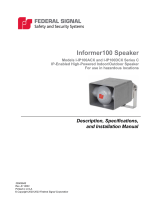 Federal Signal Informer100 Series C IP-enabled 100 Watt Hazardous Location Speaker User manual
Federal Signal Informer100 Series C IP-enabled 100 Watt Hazardous Location Speaker User manual
-
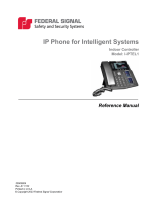 Federal Signal I-IPTEL1 IP Phone User manual
Federal Signal I-IPTEL1 IP Phone User manual
-
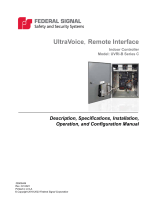 Federal Signal UltraVoice® Indoor Remote Interface Controller User manual
Federal Signal UltraVoice® Indoor Remote Interface Controller User manual
-
Federal Signal SS2000+ Series C Local Hardware Activation Point User manual
-
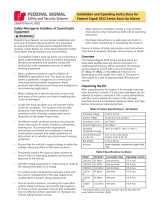 Federal Signal Work Truck 2012 Series Back-up Alarms User manual
Federal Signal Work Truck 2012 Series Back-up Alarms User manual
-
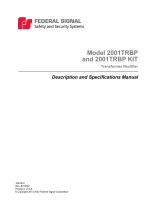 Federal Signal 2001-130 and Equinox Sirens User manual
Federal Signal 2001-130 and Equinox Sirens User manual
-
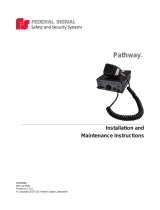 Federal Signal Pathway User manual
Federal Signal Pathway User manual
-
Federal Signal UltraVoice® UVLOC-B Local Operating Console User manual
-
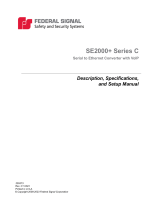 Federal Signal UVIC UltraVoice® Indoor Controller User manual
Federal Signal UVIC UltraVoice® Indoor Controller User manual
Other documents
-
Aiphone IX Series User guide
-
Baldwin Boxall BVRDTSMR User guide
-
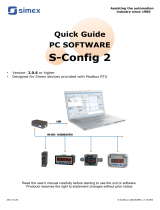 Simex S-Config Quick start guide
Simex S-Config Quick start guide
-
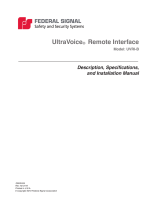 Federal Signal Corporation UVRI-B Installation guide
Federal Signal Corporation UVRI-B Installation guide
-
NEO Coolcam Z-wave Intelligent Wireless Siren Alarm User manual
-
Aaeon FWS-2272 User manual
-
Aaeon FWS-2276 User manual
-
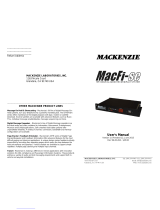 Mackenzie MacFi-se User manual
Mackenzie MacFi-se User manual
-
LY International Electronics M-2120/M-2140 Owner's manual
-
Quest RM6 User manual





















































































































